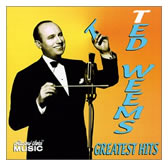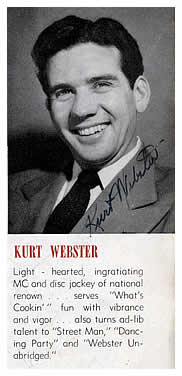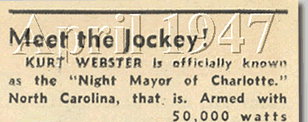
Alas, Ted Weems and all the great bands of the 1930's and 40's, like Tommy Dorsey, Benny Goodman, Artie Shaw, are gone and nearly forgotten.


Alas, Ted Weems and all the great bands of the 1930's and 40's, like Tommy Dorsey, Benny Goodman, Artie Shaw, are gone and nearly forgotten.

One of WBT's most popular announcers in the late 1940's and early '50s was Kurt Webster. One of his shows was Midnight Dancing Party, which had legions of listeners over a large swath of the U. S. One night in '47 Kurt dusted off an old recording of "Heataches" by Ted Weems' orchestra, recorded back in the 1930s. It was probably one of those "I wonder where he is today" moments. Webster kept playing the song and got so many requests and attracted so much notice that Weems actually came out of retirement, reformed his band and enjoyed a brief "new" career. Here's a brief paragraph from Weems' biography on a website that no longer exists.
"In 1935 the band welcomed a then-unknown Perry Como, who remained their featured vocalist until 1941, when Weems dissolved the group after he and many of his musicians joined the Merchant Marines to fight in World War II. In 1947 the reconstituted orchestra enjoyed an unlikely hit when their original 1933 recording of "Heartaches" became a favorite on a North Carolina station, with their promotional push eventually launching the song to national success. By the middle of the following decade Weems was working as a disc jockey in Memphis; he died in Tulsa, OK on May 6, 1963."
 |
|
 |
|
 |
|
 |
|
 |
There are other interesting facts about Ted Weems on RedHotJazz.com, along with his discography. Kurt Webster made a very successful transition to television before departing Jefferson Standard Broadcasting in the mid-1950s for WAVY in Norfolk, VA, where he worked alongside affable Willard Scott, who later would become the Today Show's weatherman on NBC-TV.
As for the old song, we've put the recording of "Heartaches" in the BT Sound Vault. Don't snicker, this was a very popular style of music back in the '30s. The whistling—not unlike that of a songbird—was by Elmo Tanner, nationally prominent for his puckered presentations. (How many nationally known whistlers can you name?)